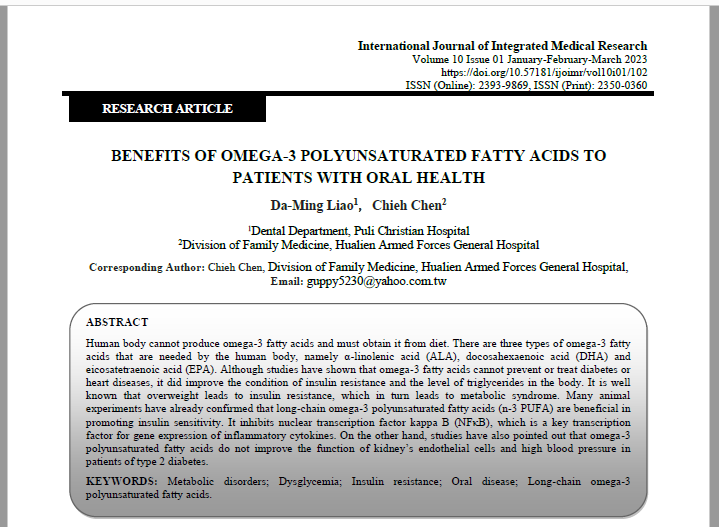Benefits of Omega-3 Polyunsaturated Fatty Acids to Patients with Oral Health
Main Article Content
Abstract
Human body cannot produce omega-3 fatty acids and must obtain it from diet. There are three types of omega-3 fatty acids that are needed by the human body, namely α-linolenic acid (ALA), docosahexaenoic acid (DHA) and eicosapentaenoic acid (EPA). Although studies have shown that omega-3 fatty acids cannot prevent or treat diabetes or heart diseases, it did improve the condition of insulin resistance and the level of triglycerides in the body. It is well known that overweight leads to insulin resistance, which in turn leads to metabolic syndrome. Many animal experiments have already confirmed that long-chain omega-3 polyunsaturated fatty acids (n-3 PUFA) are beneficial in promoting insulin sensitivity. It inhibits nuclear transcription factor kappa B (NFκB), which is a key transcription factor for gene expression of inflammatory cytokines. On the other hand, studies have also pointed out that omega-3 polyunsaturated fatty acids do not improve the function of kidney’s endothelial cells and high blood pressure in patients of type 2 diabetes.
Article Details
References
• Simopoulos AP. Dietary omega-3 fatty acid deficiency and high fructose intake in the development of metabolic syndrome, brain metabolic abnormalities, and non-alcoholic fatty liver disease. Nutrients 2013; 5(8): 2901-23.
• Chen C, Yang Y, Yu X, Hu S, Shao S. Association between omega‐3 fatty acids consumption and the risk of type 2 diabetes: A meta‐analysis of cohort studies. Journal of diabetes investigation 2017; 8(4): 480-8.
• Gao H, Geng T, Huang T, Zhao Q. Fish oil supplementation and insulin sensitivity: a systematic review and meta-analysis. Lipids in health and disease 2017; 16(1): 1-9.
• Azuma MM, Cardoso CDBM, da Silva CC, de Oliveira PHC, Jacinto RDC, Andrada AC, et al. The use of omega‐3 fatty acids in the treatment of oral diseases. Oral Diseases 2022; 28(2): 264-74.
• Lepretti M, Martucciello S, Burgos Aceves MA, Putti R, Lionetti L. Omega-3 fatty acids and insulin resistance: focus on the regulation of mitochondria and endoplasmic reticulum stress. Nutrients 2018; 10(3): 1-20.
• Rizza S, Tesauro M, Cardillo C, Galli A, Iantorno M, Gigli F, et al. Fish oil supplementation improves endothelial function in normoglycemic offspring of patients with type 2 diabetes. Atherosclerosis 2009; 206(2): 569-74.
• Dupont J, Dedeyne L, Dalle S, Koppo K, Gielen E. The role of omega-3 in the prevention and treatment of sarcopenia. Aging clinical and experimental research 2019; 31(6), 825-36.
• Wong CY, Yiu KH, Li SW, Lee S, Tam S, Lau CP, et al. Fish‐oil supplement has neutral effects on vascular and metabolic function but improves renal function in patients with Type 2 diabetes mellitus. Diabetic Medicine 2010; 27(1): 54-60.
• Farmer AJ, Montori VM, Dinneen SF, Clar C. Fish oil in people with type 2 diabetes mellitus. Cochrane Database of systematic reviews 2001; (3): 1-35.
• Jamilian M, Samimi M, Mirhosseini N, Afshar Ebrahimi F, Aghadavod E, Taghizadeh M, et al. A randomized double-blinded, placebo-controlled trial investigating the effect of fish oil supplementation on gene expression related to insulin action, blood lipids, and inflammation in gestational diabetes mellitus-fish oil supplementation and gestational diabetes. Nutrients 2018; 10(2), 163.
• Okamura T, Hashimoto Y, Miki A, Kaji A, Sakai R, Iwai K, et al. Reduced dietary omega-3 fatty acids intake is associated with sarcopenia in elderly patients with type 2 diabetes: A cross-sectional study of KAMOGAWA-DM cohort study. Journal of Clinical Biochemistry and Nutrition 2020; 19: 233-7.
• Kris-Etherton PM, Harris WS, Appel LJ. Fish consumption, fish oil, omega-3 fatty acids, and cardiovascular disease. circulation 2002; 106(21): 2747-57.
• Calder PC. Omega-3 fatty acids and inflammatory processes. Nutrients 2010; 2(3): 355-74.
• ORIGIN Trial Investigators. n–3 Fatty acids and cardiovascular outcomes in patients with dysglycemia. N. Engl. J. Med. 2012; 367(4): 309-18.
• Calder PC, Yaqoob P. Understanding omega-3 polyunsaturated fatty acids. Postgraduate medicine 2009; 121(6): 148-57.
• Gioxari A, Kaliora AC, Marantidou F, Panagiotakos DP. Intake of ω-3 polyunsaturated fatty acids in patients with rheumatoid arthritis: A systematic review and meta-analysis. Nutrition 2018; 45: 114-124.
